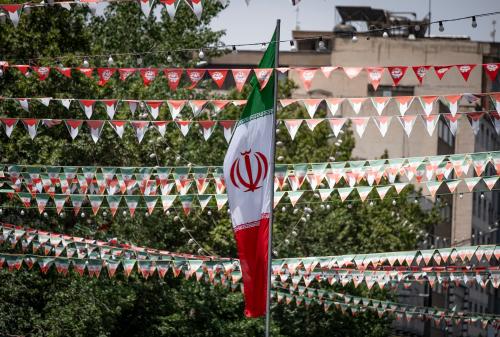Does it really matter, in the end, what Europe does about its arms embargo on China? Robert Zoellick, US deputy secretary of state, recently suggested that for the European Union to sell arms or related technologies to China would amount to painting bull’s-eyes on the backs of US troops. For many Europeans, such arguments may seem hyperbolic. Now that China has been slapped on the wrist for its antisecession law threatening war if Taiwan moves actively for independence, the EU will want to return to the issue at some point and lift its embargo. And Britain, which takes over the six-month EU presidency in June, will only be able to hold off such pressures for so long. The recent friendly visit by Lien Chan, the Taiwanese opposition leader, to mainland China may also suggest that the risk of war, and therefore the stakes in the EU arms embargo issue, are both rather low.
Nonetheless, Mr Zoellick is more right than wrong. In the absence of strong constraints on future high-technology sales, lifting the European arms embargo on China would be a big mistake. There really is a chance of a Sino-US war over Taiwan, which may ebb and flow month to month but nonetheless remains quite real. And any European decision to lift the embargo could make any war more likely and more costly in lives and assets.
The reasons are simple. First, China is serious about being willing to risk war to prevent Taiwan’s secession. Second, although many in China as well as Europe cannot quite believe it, the US is just as serious about defending Taiwan. And third, even though American military power remains far superior to that of China, the Chinese do not need to equal US power to make any war over nearby Taiwan very challenging for American forces. Given the right catalyst from Taipei, therefore, US deterrence of China could fail and the world’s first true war between nuclear weapons states could ensue.
It is not just China’s ruling communist party that considers Taiwan a part of China; an increasingly nationalistic population does as well. In fact, the Chinese see themselves as patient and restrained because they are simply demanding that Taiwan not secede, rather than insisting on immediate reunification. They worry that if Taiwan broke away, it would encourage other separatist movements in places such as Tibet and Xinjiang province, and weaken China strategically at the very moment it is poised to regain its status as a global power. China’s leaders operate on the assumption that Taiwanese secession would doom their own prospects for holding on to power. At a minimum, they would have to show they had gone the extra mile to try to prevent secession, meaning that even an unsuccessful military operation might be preferable to inaction.
And as bizarre as it may seem, the US really would fight to prevent faraway Taiwan from being conquered. This is true not only because President George W. Bush publicly said so in 2001, but also for deeper reasons. First, US credibility as a dependable security partner would be on the line in any conflict over Taiwan. After a half-century of coming to Taiwan’s aid in crises, to back down when the going got tough would cause every other US ally around the world to doubt the strength of America’s commitment. Among other implications, more countries might then pursue their own nuclear deterrents. Second, and more positively, Taiwan’s vibrant democracy elicits strong support in the US. This goes for Democrats as well as Republicans; it was the Clinton administration, after all, that sent two aircraft carriers toward the Taiwan Strait in 1996 in reaction to China’s firing of missiles near the island.
Unfortunately, many Chinese doubt America’s real commitment to Taiwan. Some argue that the US is casualty averse (despite the evidence from Iraq) and would back down from a fight over a distant island—especially a fight against another nuclear-armed state. They realise there is no binding treaty obliging the US to defend the island, and that the language of America’s 1979 Taiwan Relations Act as well as other policy statements would give Washington numerous excuses not to fight (especially if, in Chinese eyes at least, Taiwan had clearly provoked the war). Other Chinese believe their recent successes in diplomatically and economically wooing much of the Asia-Pacific region—and Europe—mean that the US, rather than China, would be isolated in any future conflict.
Even the military balance gives China hope that it would emerge successful in a crisis over Taiwan. A Chinese invasion of Taiwan remains highly unlikely, given the inherent difficulties of amphibious assault in an era of 24-hour reconnaissance and precision strike capabilities. But China has other military tools and options. In addition to threatening missile attacks, for example, it may be able to conduct a naval blockade of Taiwan. Estimates differ over the strength of the American force needed to defeat such a Chinese attempt, and the losses that would be incurred. But this very uncertainty may give Beijing hope, and a lifting of Europe’s arms embargo could give it even more hope.
The chances of a Sino-US war over Taiwan are not enormous, but are sufficiently real to be taken seriously. It is for Europeans to determine their future policy on selling arms to China, of course. But the US is on solid ground in asking that any new policy be made with eyes wide open about the huge strategic and military stakes at play.
The Brookings Institution is committed to quality, independence, and impact.
We are supported by a diverse array of funders. In line with our values and policies, each Brookings publication represents the sole views of its author(s).



Commentary
Op-edThe Risk of War Over Taiwan is Real
May 1, 2005